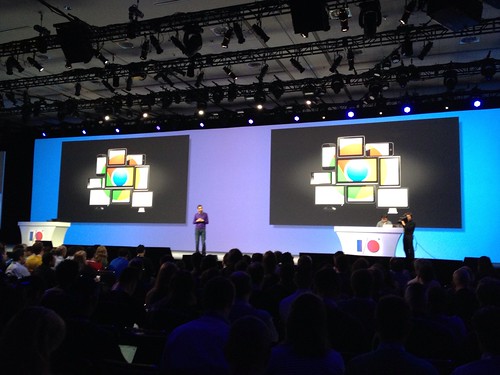
Above Photo: Google showcases interconnected screens at Google IO conference in SF.
By Chris Silva (cross posted) and Jeremiah Owyang, Industry Analysts at Altimeter Group
Last year’s over hyped skydiving was replaced by down to earth by grounded product enhancements.
We’re live from the Google IO conference in SF with 6,000 developers, press, and media in San Francisco’s Moscone event center. We noticed a lot of Glass Explorer units (which surprisingly was barely mentioned in the keynote) we’ve purchased two to test, and will write up a detailed post on them after we’ve done a thorough test.
Today’s Google’s announcements were a wreck; a series of products flipping in front of you, rather than a well laid out showroom. To make sense of this patchwork set of announcements from a fragmented company, we’ve identified some top level trends:
Key Trends at Google I/O:
Products enhanced and interconnected –no major new products announced.
- Google can coordinate across all of your screens, making multi-screen easier showing its ability to tie together all of your experiences across the Google-system.
- Ironically, Google did not mention Google Glass. We believe this is because it was overhyped last year, failed to meet production deadlines this year.
- Google+ had several enhancements including a new 3 column layout akin to flipboard, deeper content with flippable content cards, Hangout now extended to multiple browsers, Google+ profiles have improved sign on capability–but no adoption numbers were touted in this flailing social network.
Google is virtually replicating planet earth, but “improving” the quality.
- Google maps is becoming a *Virtual World*. 3D experience with our uploaded photos. With virtual goggles like Occulus Rift you can walk through this virtual world, experiencing our world in just a few mouse clicks.
- The company announced the ability to use more granular location to allow better targeting of mobile users with apps and offers, finally bringing the inherently local capabilities to mobile that we’ve been awaiting.
- Retailers and hospitality should take note, Google maps now integrates photos of your stores from the inside. Internal decor matters to the search process.
Google knows what and who you love as we trade convenience for our data.
- Google announced that they could identify highlights of top photos in your albums, they were able to identify important photos based on facial recognition of your family, grouping these as important. Google knows who your family is –and what’s important to your heart.
- Google is becoming more like a media company, music streaming (Google All Access,) photo editing, magazine-ing of the G+ stream. “Google makes the world better with data.” Google+ becomes like a magazine,
- Speech recognition across the desktop and mobile and bringing personal context to all of their services, doing things like making everyone’s view into maps personal, with their important landmarks highlighted.
What it means: An unsaid contract. Google better organizes our world –and sells us back the experience
The big takeaway is Google is trying to let consumers experience as much of your brand before they buy it, for examples a search user can experience the inside of your store, the reviews, the photos and find the fastest way there –before ever leaving their chair. As such, Google or their advertisers, may influence the purchase decision.
In mobile, It’s about the services, not the devices: While leading with mobile products last year to get people into their sandbox. In social the story focused on rich media differentiating the Google+ network and it became clear that social-first products like Hangouts and Google+ sign=in will make a broader play across more Google and non-Google products. , across data and search – whether maps or analytics – Google wants to up the ante in the tools it offers developers and, in turn, the companies and brands they empower.
The Pithy Bottom Lines:
- For consumers, if you’ve bought into the Google ecosystem, expect the tools and products to get better but know you’re the product
- For brands: If you want to play in Google’s sandbox, you’ll ultimately need to pay.
- For Google Competitors: As Google has entered media, any industry is up for grabs; they may be your competitor and just not have announced it yet.
There’s an interesting dialog on Facebook about this post. https://www.facebook.com/JeremiahOwyang/posts/10151448364276523?ref=notif¬if_t=like
There’s another message — all Google knew how to this year was product line extensions.
Interesting? In what way? I realise it’s your own facebook page, but have you actually looked at the “interesting dialog”?
That’s correct Rafer. But they’re starting to connect to each other in a deeper way.
Like M$ wanted to between office and windows before the DOJ did its duty?